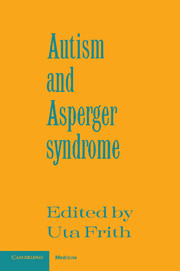Book contents
- Frontmatter
- Contents
- List of illustrations
- Acknowledgements
- 1 Asperger and his syndrome
- 2 ‘Autistic psychopathy’ in childhood
- 3 The relationship between Asperger's syndrome and Kanner's autism
- 4 Clinical and neurobiological aspects of Asperger syndrome in six family studies
- 5 Asperger syndrome in adulthood
- 6 Living with Asperger's syndrome
- 7 The autobiographical writings of three Asperger syndrome adults: problems of interpretation and implications for theory
- Name Index
- Subject Index
7 - The autobiographical writings of three Asperger syndrome adults: problems of interpretation and implications for theory
Published online by Cambridge University Press: 18 December 2009
- Frontmatter
- Contents
- List of illustrations
- Acknowledgements
- 1 Asperger and his syndrome
- 2 ‘Autistic psychopathy’ in childhood
- 3 The relationship between Asperger's syndrome and Kanner's autism
- 4 Clinical and neurobiological aspects of Asperger syndrome in six family studies
- 5 Asperger syndrome in adulthood
- 6 Living with Asperger's syndrome
- 7 The autobiographical writings of three Asperger syndrome adults: problems of interpretation and implications for theory
- Name Index
- Subject Index
Summary
‘How far can autistic children go in matters of social adaptation?’ This question formed the title of a paper by Kanner in 1973. It is a question still asked by parents and professionals, and in a sense it is the question we ask when we look at the writings of the more able autistic or Asperger syndrome individual. Surely the self-expression of writing, and especially of writing about oneself, must put to the greatest test those social, imaginative and communicative skills thought to be crucially impaired in autism? There can be little doubt, then, that those autistic adults who manage to produce autobiographical works are among the most successful cases – in terms both of their degree of social adjustment and of their intellect.
Several questions then arise: just how able are these people, or rather perhaps just how handicapped? What can we point to in their writings that deserves the label ‘autistic’? And what is it about even the most able patients that leads us to say autism is a handicap that one does not grow out of? These writings, then, present a challenge to our theories of autism in so far as they represent and bring home to us the very real and striking range of abilities shown within the group of people we call autistic.
- Type
- Chapter
- Information
- Autism and Asperger Syndrome , pp. 207 - 242Publisher: Cambridge University PressPrint publication year: 1991
- 71
- Cited by



